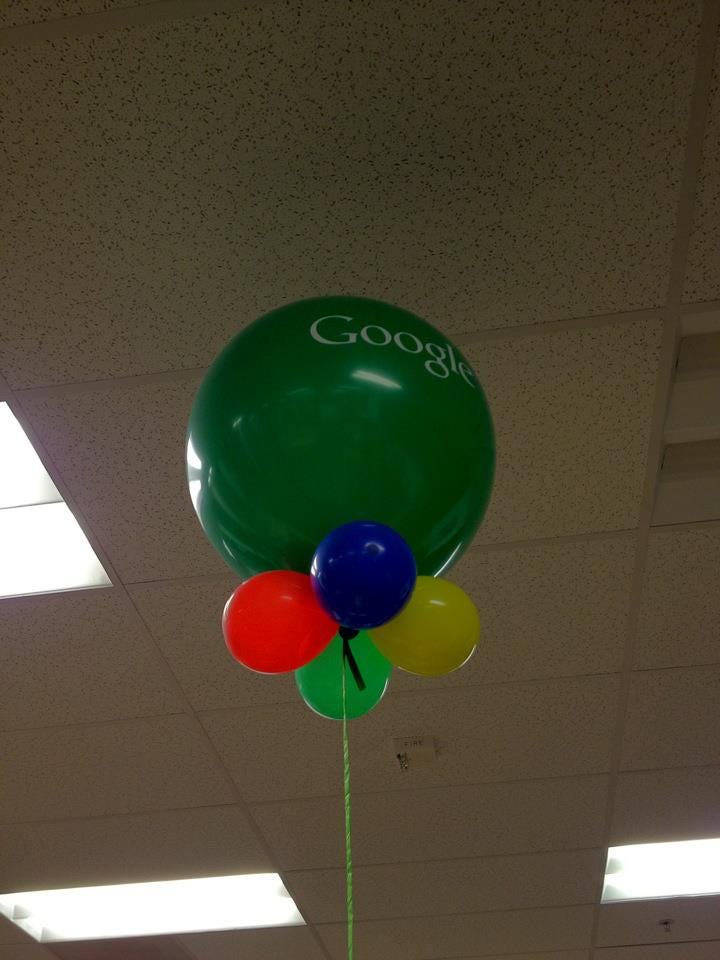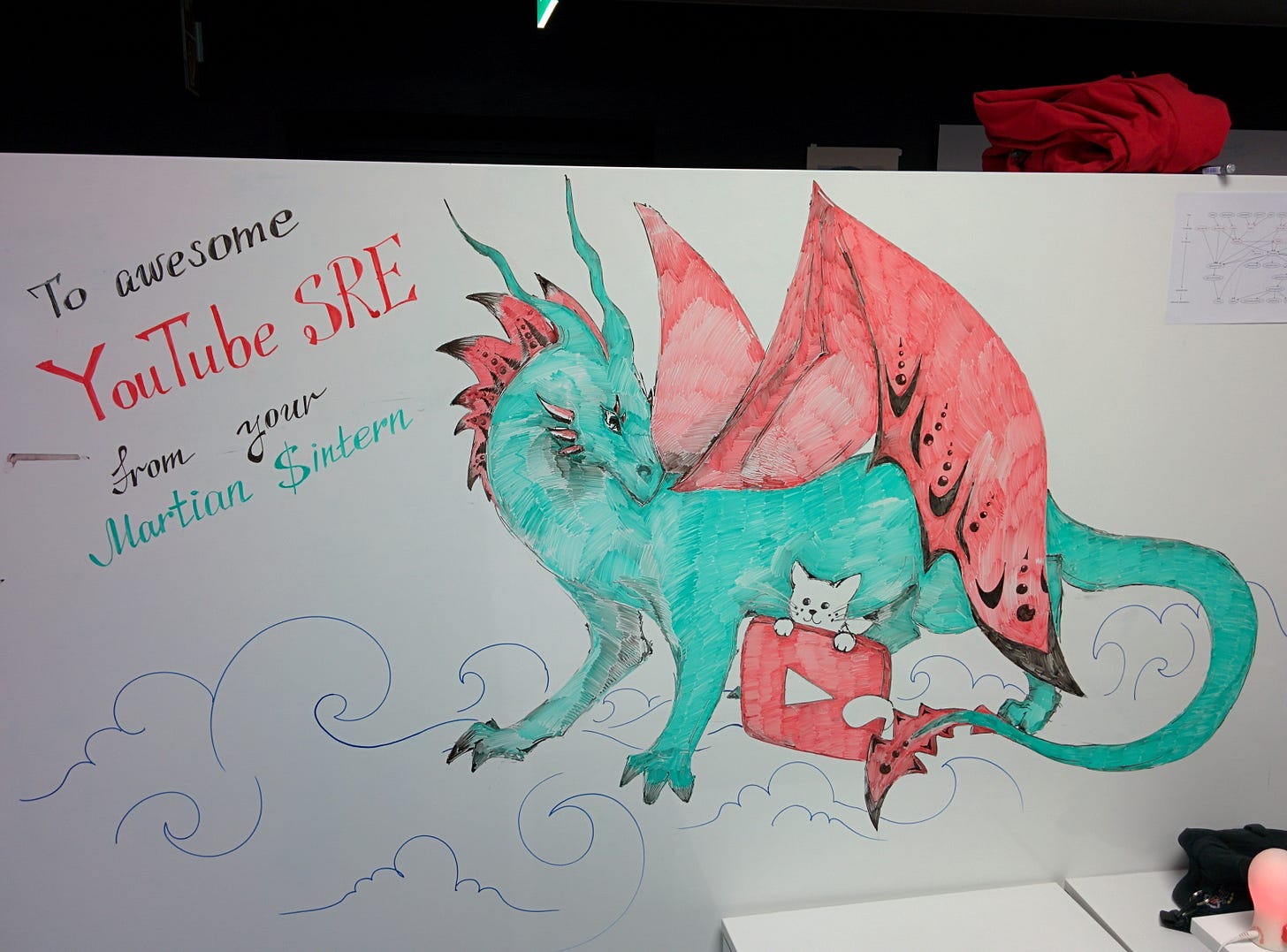How I made my biggest career mistake at the time I joined Google
You'll have a bad time if you get confused about when you have leverage
Writing this edition of my newsletter is a departure from the norm. While I usually find crafting these updates to be very enjoyable, this one has been emotionally taxing. It brings me back to challenging periods both in my career and personal life. Nevertheless, I believe that sharing this story is important, offering lessons that could potentially help others sidestep the pitfalls I encountered.
California Dreaming
Imagine you have been job hunting for a while, not out of desperation but in search of something extraordinary, your next big thing. You've zeroed in on various companies—some fine, others excellent, and one that stands as your ultimate goal. You even met some people from that dream company at an industry event and were enamored by the stories they told. Maybe you even read a book or two about them (I know, that sounds desperate). Despite the allure, you're plagued by self-doubt about fitting in.
You muster the courage to apply, and soon enough, a recruiter reaches out. The interview process is intense and rigorous, but you manage to keep up. When the final round ends, you're in suspense. Then, the call comes with the recruiter saying, "Ryszard, I have some very good news." Your reaction? Well, I responded by making my biggest career blunder.
Flashback to 2011. I was 26 years old, and my dream company was Google. Back then, it was the pinnacle of cool in the tech world. To add to the allure, my aspiration was to relocate to California. Needless to say, I jumped at the job offer. I haggled a bit over the compensation and secured some extra Google stock. My wife and I were ecstatic, and we moved from Warsaw to the San Francisco Bay Area with high hopes.

My first two weeks at Google were devoted to training, and they were exhilarating, replete with fascinating activities and new technologies. I found the other "nooglers," Google's slightly pretentious but lovable term for new hires, quite engaging. Eager to get my hands dirty, I couldn't wait to dive into meaningful work.
Minor panic attacks
Reality really hit me when I was tasked with working on Rights Management for YouTube, the system that enables record labels to claim their intellectual property in videos for revenue sharing. Initially devised after Viacom and other companies sued Google post-YouTube acquisition, the system's primary goal was to manage legal risk rather than user satisfaction. I wasn't involved in the fascinating audio fingerprinting aspect; instead, I focused on the labyrinthine system that determined the distribution of royalties. Its users were underpaid workers at record labels with no alternatives for claiming their due. Though I had a deep interest in web development and took my craft seriously, this project lacked any semblance of best practices and was universally disliked.

Despite being a backwater product (one of the engineers, a really impressive hacker, was literally banished to it—but that is not a story for this newsletter), most of my teammates were decent people. The glaring exception was my manager, a person so toxic that I made her the antithesis of everything I aspired to be as a future manager. One-on-one meetings with her regularly reduced colleagues to tears. On one unforgettable occasion, we had a one-on-one on my birthday that she spent berating me for not changing enough lines of code in my CLs (changelists, think "pull request"). It wasn’t about the quality of my work; just the sheer number of lines. I was flabbergasted; honestly, I couldn't quite believe such words could be uttered not in jest at a company like Google, by someone in the engineering organization. This experience pushed me to the brink; I knew I either had to switch teams within Google or, if that wasn't feasible, leave the company altogether. The decision was fraught with complications. Not only would I potentially have to return my sign-up bonus that I'd already spent and paid taxes on, but quitting Google would also mean losing my US H1B visa. This would most likely force me to move back to Europe, a relocation for which I'd also be financially responsible. Given that I'd just relocated my family from Europe to the US, the stakes were incredibly high.
Switching teams within Google proved more arduous than I'd ever expected, largely due to my manager's deliberate efforts to impede my transfer. During my performance review, she manipulated my grade to the lowest possible score that wouldn't trigger a performance improvement plan—thus avoiding HR's attention, a grading I didn't feel was merited by my work. When I found a team interested in having me, partly due to some work I'd done for them during my 20% time, my old manager went so far as to bully that team's manager into rescinding their offer.
Ultimately, my transfer required director-level negotiations, an absurdity that struck me even more after later becoming a director myself. However, the change was worth the hassle. My new team was exceptional, and my manager there was Libor Michalek, who years later would recruit me to launch Affirm's office in Warsaw. I got the opportunity to work on Vitess (not only a cool product, but also open source!), which was fulfilling. Eventually, I transitioned into an SRE role and moved to Zürich, a job that became one of my most enjoyable experiences.
Interestingly, I later discovered I wasn't alone in feeling haunted by that former manager. After settling into my new team, I bumped into a colleague who had also moved on from that toxic environment. He confided that even a brief hallway encounter with our old manager still gave him a minor panic attack.
The good and the bad
My regret isn't taking the offer from Google. In fact, joining Google supercharged my career in a way I couldn't have anticipated, especially considering my unconventional background. I was a philosophy major and a college dropout, always feeling the need to prove myself as a competent engineer. But at Google I gained invaluable expertise in databases, scalable distributed systems, and concurrent programming. Moreover, the friendships and professional relationships I formed there have endured; individuals like Mike Solomon, Sugu Sougoumarane, Shruti Patil, and Alain Jobart aren't just colleagues—they're my engineering heroes. My time as an SRE in Zürich wasn't just exciting (being responsible for YouTube staying up really keeps the adrenaline flowing); it was also a chapter of genuine belonging, thanks to a team that welcomed me and made me feel a true sense of community (shoutout to Raushaniya, Mairbek, Prashant, Janne, Martin, Liam, Als, Simon, Jos, and Alex!). So, what was my mistake?

During the interview phase, I had conversations with members of the prospective team at YouTube. Despite a nagging feeling that the product might not align with my interests, I chose to ignore it. My eagerness to join Google and make the big move to the US clouded my judgment. I assumed that after spending a few months on this YouTube team, transferring elsewhere within the company would be a breeze, all while having gained a better grasp of the organization's inner workings.
This assumption turned out to be a delusion. With the benefit of hindsight, I now understand the intricacies of how a large corporation like Google operates. These institutions have established processes for almost everything, from salary negotiations to team transfers. Designed to minimize disruption, these processes operate under the presumption that your initial placement is the correct one, making any exceptions rare and fraught with resistance.
Lastly, this is when your prospective manager has the most latitude for negotiation. If they want to offer you a higher salary, they usually have some leeway to wrangle with the hiring committee or payroll department. Exceptional candidates often secure more than what was initially budgeted. Once you join, however, that flexibility dwindles. Formal processes exist for raises and promotions, making any exceptions highly unusual. This consistency is essential, as bending the rules for one person could be perceived as unfair to the broader employee base.
Once you sign the employment contract, assume that any subsequent changes will likely be more challenging to make.
Lessons Learned
What advice would I give to my younger self?
Although recruiters are aligned with your interests to some extent, they may rush you into making a hasty decision—they're keen to celebrate their win and move on. Remember, once you sign, you're no longer their responsibility. Take the time to thoroughly research your potential team. Speak to the manager and future co-workers, inquiring about the technical stack, work culture, and other pertinent details. If something feels off, resist the temptation to engage in wishful thinking. More often than not, a closer look from the inside won't make things appear better. I'm not suggesting you should only accept 'perfect' job offers, but if you identify shortcomings, consider negotiating a higher salary to offset those drawbacks.
What are some red flags to watch out for?
"If you do your job well, we'll promote you." This statement doesn't capture how promotions actually work in companies like Google (or, to be honest, any reasonable company). There, you're typically expected to already be performing at the level you aim to be promoted to. Advancing a level is meant to be a significant achievement and is relative to your current performance. Don't expect an easy promotion just for doing your job.
"You can start on this team, then move later." Given my own experience falling for this, I hope it's clear why it's a red flag.
"We're using old tech you dislike, but we plan to transition to new tech you love." This could be a classic bait-and-switch tactic. Changing the tech stack in a large company is no small feat. If this is a selling point for you, press the manager for explicit commitments.
"This is Google/Meta/Apple/..., how bad could it be?" Well, pretty damn bad. It's easy to think that brand prestige guarantees a great work environment, but remember that large companies are a mosaic of diverse teams and cultures. I've seen firsthand at YouTube how one team can be incredibly toxic while another is wonderfully supportive. Plus, big corporations excel at employer branding, crafting an idyllic image that may not align perfectly with day-to-day realities. Although I consider Google a fantastic place to work, their employer branding team deserves a standing ovation for depicting it as a utopia for tech enthusiasts.
Conclusion
While my time at Google offered immense learning opportunities and opened many doors in my career, it came at a significant emotional cost. The strain began with a toxic managerial relationship that seriously eroded my sense of professional self-worth. This tension amplified the inherent stress of a transcontinental move, coupled with visa restrictions. What intensified this turmoil was the cognitive dissonance I felt: I was supposed to be living my dream job, yet I was unhappy—a reality that took time to fully acknowledge. This emotional strain didn't stay confined to the workplace; it spilled over, impacting my marriage as well. Fortunately, the California's culture made couples therapy a viable and accessible option for us, offering a lifeline for navigating these relational challenges—a step that simple wouldn't have occurred to us back in Poland.
What made my professional difficulties even more challenging was that before Google I only worked startups and smaller companies with less formal managerial structures. This lack of prior experience in large corporate settings made me more susceptible to taking my Google manager's criticisms too personally. I erroneously assumed that a prestigious company like Google would have impeccable managerial standards. This misplaced trust deeply affected my confidence as an engineer. It wasn't until I gained managerial experience myself that I could fully understand the dynamics at play and rebuild my self-esteem.
In summary, succeeding at a large corporation like Google demands both technical skill and emotional savvy. The recruitment phase offers you the most leverage, so make the most of it to secure favorable conditions for your role. Stay alert for red flags; a little caution upfront can save you long-term disappointment. Despite the emotional and relational hurdles, my time at Google was a pivotal and enriching chapter in my career. By being informed and thoughtful from the beginning, you increase your chances of not just landing a job, but embarking on a rewarding and fulfilling career journey.
Are you reading this? Do you find this interesting? I have no idea, unless you reply to this email or write a comment. I am mostly OK with sending these emails into the void, but I wouldn’t mind feedback. Also, if you know someone who may be interested, please forward this to them!




Awesome story, and to the extent that it needs it, I can corroborate all of the information in here, including the fact that Raushaniya was an awesome and amazing intern :-)